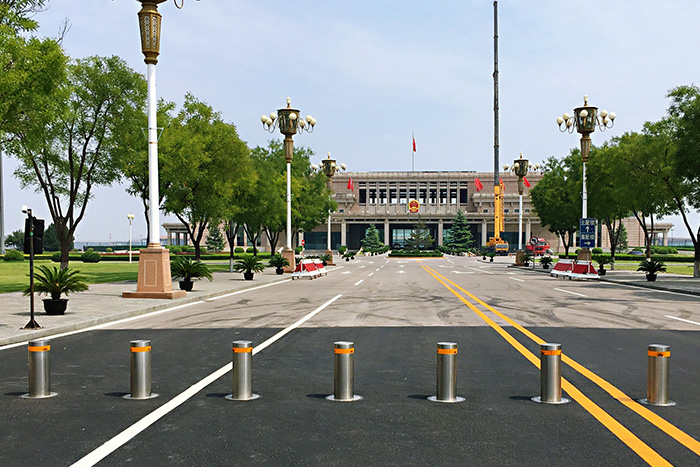Automatic bollards are versatile and effective security devices commonly used to control vehicular access to restricted areas, enhance traffic flow management, and improve safety in various settings such as entrances, parking lots, and pedestrian zones. These bollards operate through a combination of hydraulic, pneumatic, or electric mechanisms to rise and retract from the ground automatically. This guide provides an overview of how automatic bollards work and their applications in access control and security management.
Working Mechanism of Automatic Bollards
Automatic bollards are designed to provide controlled access by allowing or restricting the passage of vehicles. The working mechanism involves the following key components:
Bollard Housing: The bollard housing is installed in the ground and contains the necessary mechanisms, controls, and power sources.
Rising and Lowering Mechanism: Inside the bollard housing, there is a lifting mechanism that consists of a motor, hydraulic cylinder, or pneumatic system. This mechanism is responsible for raising and lowering the bollard.
Control System: The control system manages the operation of the bollards. It can be manual, semi-automatic, or fully automatic, depending on the application and security requirements.
Access Control Devices: Access control devices such as keypads, proximity cards, remote controls, or security cameras are used to activate and control the bollards. These devices ensure that only authorized personnel can operate the bollards.
HA501-1000 Hydraulic Automatic Bollard
Operational Modes
Automatic bollards can function in different modes to suit various access control scenarios:
Automatic Mode: In this mode, the bollards automatically rise when a vehicle is detected by sensors or when a valid access control device is presented. Once the vehicle passes, the bollards automatically lower to allow the flow of traffic.
Semi-Automatic Mode: In this mode, a user initiates the bollard’s movement using a remote control or an access control device. The bollard remains in the raised position until manually lowered.
Manual Mode: Manual mode allows the user to raise or lower the bollard on demand using a physical key or control device.
HA104-600 Hydraulic Automatic Bollard
Applications of Automatic Bollards
Automatic bollards have a wide range of applications in access control and security management:
Traffic Flow Control: Automatic bollards are used to regulate the flow of traffic, prevent unauthorized access, and manage vehicle entry and exit points.
Pedestrian Safety: In pedestrian zones, bollards help protect pedestrians by preventing unauthorized vehicle entry.
Parking Facilities: Automatic bollards are utilized to secure parking areas, allowing access only to authorized vehicles.
Public Spaces: They are deployed in public spaces to prevent vehicle access to sensitive areas during events or demonstrations.
Perimeter Security: Automatic bollards are often part of perimeter security systems, preventing unauthorized vehicles from approaching sensitive buildings or facilities.
Benefits of Automatic Bollards
Security: Automatic bollards provide effective access control, enhancing security by preventing unauthorized vehicle access.
Flexibility: The different operational modes allow flexibility in controlling access according to specific requirements.
Traffic Management: These bollards help optimize traffic flow and manage vehicle movement in designated areas.
Safety: Automatic bollards improve pedestrian safety by preventing vehicles from entering pedestrian zones.
Deterrence: The visible presence of automatic bollards acts as a deterrent to unauthorized vehicle entry.
Conclusion
Automatic bollards play a crucial role in access control and security management, providing efficient and reliable vehicle access regulation in various environments. By utilizing hydraulic, pneumatic, or electric mechanisms, they offer seamless control over vehicle entry and exit points. Whether in commercial, industrial, or public spaces, automatic bollards contribute to enhancing security, optimizing traffic flow, and safeguarding pedestrians and property.



